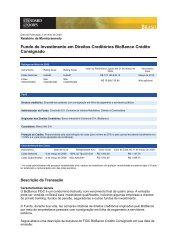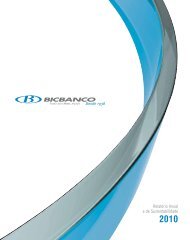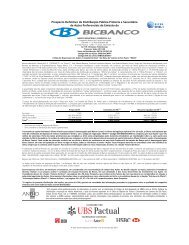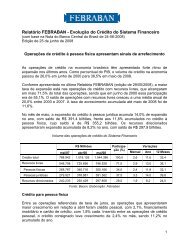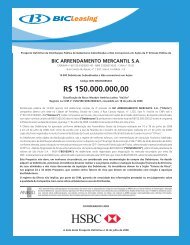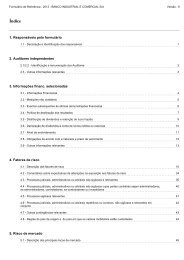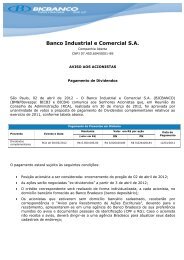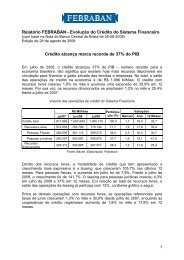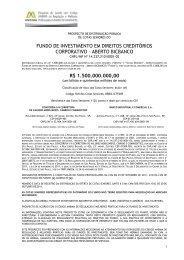HSBC J.P. Morgan Standard Chartered Bank - bicbanco
HSBC J.P. Morgan Standard Chartered Bank - bicbanco
HSBC J.P. Morgan Standard Chartered Bank - bicbanco
Create successful ePaper yourself
Turn your PDF publications into a flip-book with our unique Google optimized e-Paper software.
The <strong>Bank</strong> has no control over, and cannot predict, any measures or policies adopted by the Brazilian<br />
government in the future. The <strong>Bank</strong>’s business, results of operations, financial condition and the market for the<br />
notes may be adversely affected by changes in policies or rules involving the factors such as:<br />
• banking regulations;<br />
• the regulatory environment;<br />
• interest rates;<br />
• exchange rate variations;<br />
• exchange control policies;<br />
• inflation;<br />
• liquidity of domestic capital and lending markets;<br />
• tax policies; and<br />
• other political, diplomatic, social and economic developments affecting Brazil.<br />
In October 2010, presidential elections will take place in Brazil. Even though the federal government has<br />
adopted solid economic policies over the last few years, uncertainties, in relation to the implementation by the new<br />
government of changes relating to the monetary, tax and pension funds policies as well as to the relevant legislation<br />
may contribute to economic instability. These uncertainties and new measures may increase market volatility of<br />
Brazilian securities issued abroad. It is not possible to predict whether the government elected in 2010 or any<br />
succeeding governments will have an adverse effect on the Brazilian economy, the Brazilian securities market, and,<br />
consequently, on the <strong>Bank</strong>’s businesses.<br />
Inflation, and government measures to curb inflation, may contribute significantly to economic uncertainty in<br />
Brazil and to heightened volatility in the Brazilian securities market.<br />
Brazil has historically experienced extremely high rates of inflation. More recently, inflation rates in Brazil<br />
for the years ended December 31, 2009, 2008 and 2007, as measured by the national consumer price index (Indice<br />
de Preços ao Consumidor Amplo) or IPCA, were 4.31%, 5.9% and 4.5%, respectively. Inflation and governmental<br />
measures to combat inflation have historically had significant negative effects on the Brazilian economy. Inflation,<br />
together with government measures to combat inflation and public speculation about possible future government<br />
measures, has had significant negative effects on the Brazilian economy and contributed to increase economic<br />
uncertainty in Brazil and heighten volatility in the Brazilian securities markets, which may have an adverse effect on<br />
the <strong>Bank</strong>.<br />
These measures to combat inflation have historically included maintaining a tight monetary policy with<br />
high interest rates, thereby restricting the availability of credit and reducing economic growth. As a result, interest<br />
rates, as measured by SELIC, have fluctuated significantly. Increases in the SELIC rate may have an adverse effect<br />
on the <strong>Bank</strong> by reducing demand for its credit, and increasing its cost of funds, domestic debt expense and the risk<br />
of customer default. Decreases in the SELIC rate may also have an adverse effect on the <strong>Bank</strong> by decreasing the<br />
interest income it earns on its interest-earning assets and lowering its revenues and margins.<br />
Future Brazilian government actions, including interest rate decreases, intervention in the foreign exchange<br />
market and actions to adjust or fix the value of the real may trigger increases in inflation. If Brazil experiences<br />
fluctuations in rates of inflation in the future, the <strong>Bank</strong>’s costs and net margins may be affected and, if investor<br />
confidence lags, the price of the <strong>Bank</strong>’s securities may fall. Inflationary pressures may also affect the <strong>Bank</strong>’s ability<br />
to access foreign financial markets and may lead to counter-inflationary policies that may have an adverse effect on<br />
the <strong>Bank</strong>’s business, financial condition, results of operations and the market price of the notes.<br />
AMR-248898-v2<br />
- 24 -<br />
95-40469277



